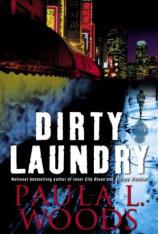Dirty Laundry
Review
Dirty Laundry
Police work involves quite a bit more than fighting crime. There
is, and always has been, a political and cultural element to it, as
well as the tide of different ethnicities that ebb and flow into
and out of a city. This is hardly a recent development; Irish
police resented the influx of Italian officers into the New York
City and Chicago police ranks during and after the turn of the 20th
century; the New Orleans Police Department for years roiled with
the uneasy mixing of Italian and French South Louisiana officers,
who in turn, had to adjust to the inevitable but overdue influx of
black officers into the ranks.
The race of the officers is not the only factor that affects a
police department, however. Nor is the size of the city the
department patrols. There is a municipality within spitting
distance of my residency that has made national headlines by virtue
of the fact that it exists solely to support its police department,
which writes traffic tickets by the handful, in order to support
its police department, which writes traffic tickets by the handful,
in order to...well, you get the idea.
Most police procedural novels lead the reader painstakingly through
the evidence-gathering process, and while they may touch on the
internal and external politics of the department, that touch is
light and almost incidental. That is not the case with the
Charlotte Justice novels.
Justice is a black homicide detective in the LAPD Robbery-Homicide
Division. Her creator, Charlotte Woods, has carved out a series in
which Justice and her supporting characters are constantly
evolving, making mistakes, paying for them, and moving on. The
crimes that are investigated usually take place off the page,
though the violence that is transmitted through the crime scene
description to the reader is certainly graphic enough. Woods's
major accomplishment, however, is to nicely balance her description
of the crime-solving procedure against the backdrop of the
political and social factors that affect how, and in some cases
whether, the crime is investigated and the wrongdoer
apprehended.
DIRTY LAUNDRY, the latest of Woods's Charlotte Justice novels,
begins with the grisly discovery of a murder in a transient area of
Koreatown. The victim is quickly determined to be Vicki Park, an
up-and-coming political assistant to mayoral candidate Mike Santos.
There is no lack of suspects, from Park's fiancée to members
of Santos's campaign staff to, surprisingly enough, members of the
Los Angeles Police Department. Park, it seems, was a bit of a
maverick, a Korean working on the campaign of a Hispanic mayoral
candidate and, as it turns out, did not approve of some of his
campaign tactics. Yet, there were other mayoral candidates who also
did not approve of his work.
Justice finds that her investigation is hamstrung by opportunists
in the police department, political realities (she can investigate
candidates, but not too closely) and even, to some extent, her
personal life. It is almost a foregone conclusion that solving
Park's murder will have some effect on the mayoral campaign. When
the identity of the murderer is revealed, it should not be a
surprise, but it is a very big one.
DIRTY LAUNDRY even contains echoes of some of Raymond Chandler's
best work, in the sense that Woods, like Chandler, utilizes her
well-crafted storylines as a vehicle for commenting on the culture
of Los Angeles. Reading Woods is like walking down the sidewalk of
a neighborhood that you would, at best, only drive through, if you
knew that it existed at all. The difference is that, once you take
one of Woods's tours, you will keep coming back.
Given the fresh publicity that accompanies the publishing of DIRTY
LAUNDRY, Woods can begin getting the attention her work needs and
so greatly deserves. DIRTY LAUNDRY is a gritty, haunting work that
is intriguing the first time through and that will no doubt stand
up to repetitive readings.
Reviewed by Joe Hartlaub on January 21, 2011





